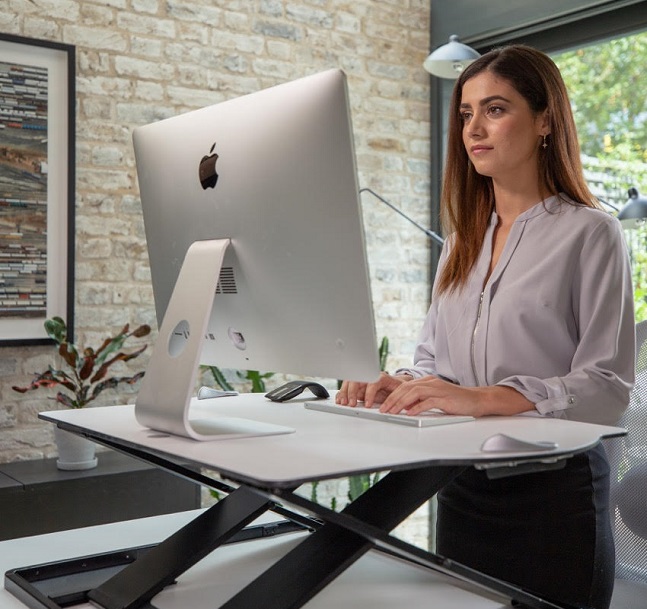Today’s graduates demand the right to roam at work with standing desks
A new survey reveals today’s recent university graduates demand the freedom of movement at work with access to standing desks a top priority.
According to the new poll, conducted on behalf of Posturite – the UK’s leading workplace health and ergonomics company – two thirds of all recent graduates (66%) would seriously consider turning down a new job if the option of a standing desk wasn’t made available.
In fact, 79% believe UK employers should provide their staff with the right to roam that comes with having sit-stand desks at work. Sixty four percent believe having access to a sit-stand desk is as important as more traditional employee benefits such as health insurance (64%), company pension (40%), company car (36%) and a gym membership (31%).
The findings are not surprising considering that almost seven out of 10 (69%) of new graduates admit they often or always feel sluggish at work. Sixty seven percent of graduates suffer with back pain and for those who do, 78% have been warned by a health professional that sitting at a desk all day may be a contributing factor to their pain.
To relieve their symptoms and attempt to feel more energised, 68% admit to frequently walking around the office and standing up to change their work position (35%). As a result, over three quarter of them (76%) say that given the choice, they would prefer to work at a sit-stand desk.

Posturite’s CEO Ian Fletcher-Price says:
“These results demonstrate our top grads are not afraid to vote with their feet when it comes to flexibility of movement and the right to roam at work. Having access to a sit-stand desk is now viewed as a top pre-requisite of employment for our country’s future business leaders.”
The benefits of sit-stand desks have been known for some time. Indeed 90% of Scandinavians already use sit-stand desks versus just 1% of the UK. However, with mounting evidence of their physical, psychological and increased productivity advantages, the traditional, static workstation might soon become obsolete.
There is a growing body of research which reveals that being confined to traditional, static desks cause physical and psychological issues.
The survey reinforces the results of new research carried out last month by the Human Brain Research department at UCL. It involved a group of office-based workers in London – who typically spend all day at a traditional static workstation – having access to the Opløft platform, a portable height-adjustable sit-stand desk.
The researchers found that using the Opløft increased the accuracy and speed of accomplishing tasks and improved overall decision making and happiness.
Lead researcher Vincent Walsh, Professor of Human Brain Research, said:
“Our research revealed that workers using Opløftwere twice as competent in their decision-making skills, and their language-based problem skills also improved by 64%. They also completed tasks measuring concentration and vigilance 10% faster and made 45% fewer mistakes. Their creativity also improved by 28%.”
Whilst the physical benefits of being less sedentary have been widely recognised – such as decreasing the risk of musculoskeletal disorders, obesity and life expectancy, this is the first ever piece of research that proves how the flexibility of movement at work enhances overall productivity levels and boosts brain power and emotional wellbeing.
Ian Fletcher-Price views Opløft as a revelation in standing desk design.
Not only does it give users the ability to stand to work, but it is also slim and light enough to be easily transported between environments.
He said: “For centuries we have gone to work. Now, thanks to portable technology, work goes with us. The days of sitting at one desk all day are long gone. With Opløft we no longer need to be slaves to our desks because it goes where we go. Agile working gives us the freedom to choose how and where we do our work, Opløft gives us the practical means to achieve that.”
Adding clinical expertise to Opløft’s development is Chartered Physiotherapist, Ergonomist and Lead Consultant Katharine Metters, who said: “This new research shows that enabling your workforce to decide what work to do, where, and when – with maximum flexibility, promoting movement and good postures, produces a significantly happier, healthier and ultimately a more productive workforce.”
So would you turn down a job based on the desk?

Just a group of real women dealing with life’s daily struggles! Want to write for us? Email: hello@thedailystruggle.co.uk